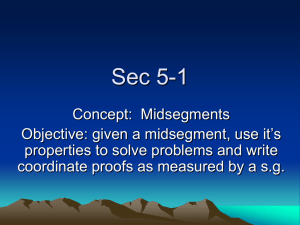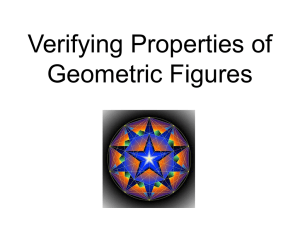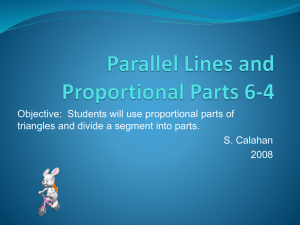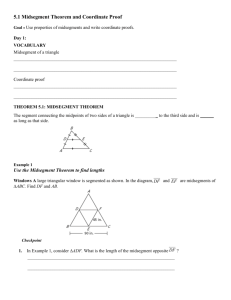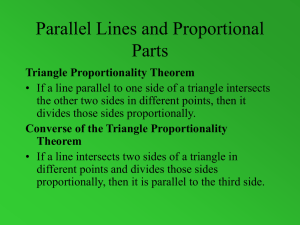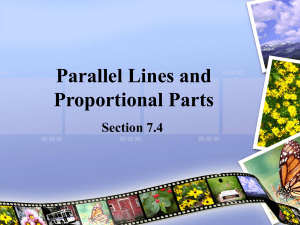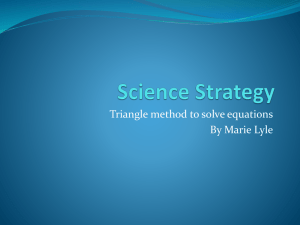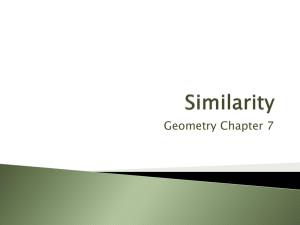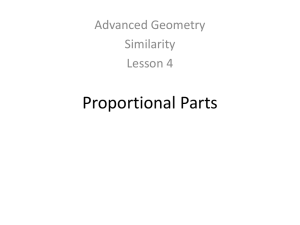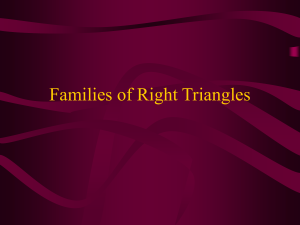Triangle Midsegment Conjecture Worksheet
advertisement
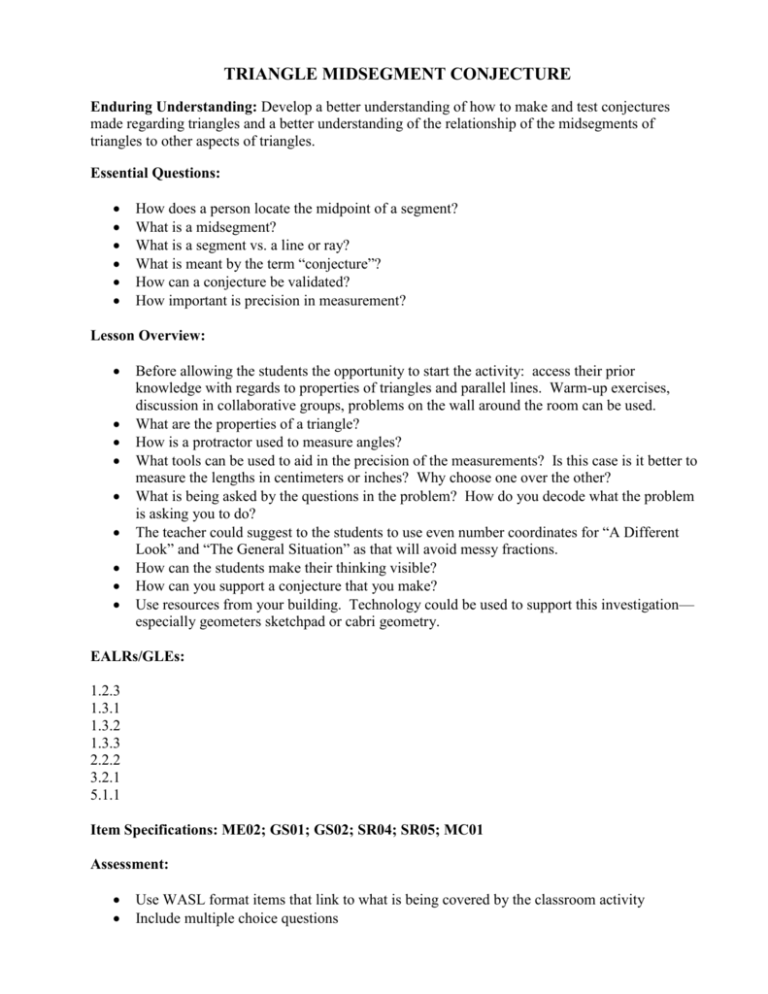
TRIANGLE MIDSEGMENT CONJECTURE Enduring Understanding: Develop a better understanding of how to make and test conjectures made regarding triangles and a better understanding of the relationship of the midsegments of triangles to other aspects of triangles. Essential Questions: How does a person locate the midpoint of a segment? What is a midsegment? What is a segment vs. a line or ray? What is meant by the term “conjecture”? How can a conjecture be validated? How important is precision in measurement? Lesson Overview: Before allowing the students the opportunity to start the activity: access their prior knowledge with regards to properties of triangles and parallel lines. Warm-up exercises, discussion in collaborative groups, problems on the wall around the room can be used. What are the properties of a triangle? How is a protractor used to measure angles? What tools can be used to aid in the precision of the measurements? Is this case is it better to measure the lengths in centimeters or inches? Why choose one over the other? What is being asked by the questions in the problem? How do you decode what the problem is asking you to do? The teacher could suggest to the students to use even number coordinates for “A Different Look” and “The General Situation” as that will avoid messy fractions. How can the students make their thinking visible? How can you support a conjecture that you make? Use resources from your building. Technology could be used to support this investigation— especially geometers sketchpad or cabri geometry. EALRs/GLEs: 1.2.3 1.3.1 1.3.2 1.3.3 2.2.2 3.2.1 5.1.1 Item Specifications: ME02; GS01; GS02; SR04; SR05; MC01 Assessment: Use WASL format items that link to what is being covered by the classroom activity Include multiple choice questions Triangle Midsegment Conjecture Adapted from the Charles A. Dana Center at the University of Texas at Austin, © 2002 Situation 1 Triangle Midsegment Conjecture Use paper, pencil, construction and measuring tools 1. Sketch and label a ABC . Find and label point D (the midpoint of side AB ) and point E (the midpoint of side AC ) Draw midsegment DE Take and record the following measurements in centimeters and degrees. DE = _______________ BC = _______________ ADE = _______________ AED = _______________ DBC _______________ ECB _______________ 2. Repeat the steps in #1 (including the measurements) with two more triangles that are different from your original triangle. 3. Based on your drawings and measurements, complete the following conjecture: The midsegment of a triangle is _________________________________ to one side of the triangle, and its length is ____________________________________ of that side. Why is it true? If you successfully completed Situation 1, you discovered two important characteristics of a triangle’s midsegment: a. The midsegment is parallel to a side of the triangle. 1 b. The midsegment is the length of the side of the triangle it is parallel to. 2 What could influence a person’s ability to reach the conclusions stated above? ________________ ________________________________________________________________________________ ________________________________________________________________________________ ________________________________________________________________________________ ________________________________________________________________________________ ________________________________________________________________________________ In order for your conjecture to be fully convincing from a mathematical standpoint, it must satisfy three requirements. First, it must be logical. Second, it must consist of facts, definitions, postulates, or theorems that have been previously proven or accepted as true. Third, it must apply to all cases. Write an explanation of why the properties of triangle midsegments are true. Your explanation must satisfy all of the above requirements. Use your knowledge of postulates and theorems about parallel lines and angle relationships to help with your explanation. ________________________________________________________________________________ _________________________________________________________________________________ _________________________________________________________________________________ _________________________________________________________________________________ _________________________________________________________________________________ _________________________________________________________________________________ ________________________________________________________________________________ _________________________________________________________________________________ _________________________________________________________________________________ _________________________________________________________________________________ _________________________________________________________________________________ _________________________________________________________________________________ _________________________________________________________________________________ _________________________________________________________________________________ A Different Look Mathematicians call explanations similar to the one you wrote in the previous situation “proofs.” In order to prove the second property about triangle midsegments is true in another situation, it is helpful to represent the situation in a different mathematical context. 1. Draw and label triangle a ABC on the graph. Label and record the numerical coordinates of points A, B, and C. Coordinates of Point A ____________; Point B ____________; Point C ___________ 2. Use the midpoint formula to find and label the following: point D (the midpoint of segment AB ) and point E (the midpoint of segment AC ). Show all of your calculations Coordinates of Point D ____________; Point E ____________ 3. Use the distance formula to calculate the length of DE and to calculate the length of BC . Show all of your calculations. Length of DE _________________; Length of BC _____________________ 4. What is the relationship between the length of DE and the length of BC ? ______________________________________________________________________________ ______________________________________________________________________________ ______________________________________________________________________________ ______________________________________________________________________________ 5. Do the diagram and calculations above constitute a proof of the second property of triangle midsegments? Write a few sentences discussing why or why not. ______________________________________________________________________________ ______________________________________________________________________________ ______________________________________________________________________________ ______________________________________________________________________________ ______________________________________________________________________________ ______________________________________________________________________________ The General Situation Any triangle may be rotated and translated so that one vertex is at the origin and another vertex is on the positive x-axis. 1. Fill in the coordinates of points A, B, and C using variables to represent the coordinates in the above diagram. 2. Use the midpoint formula to calculate and fill in the coordinates of point D (the midpoint of AB ) and point E (the midpoint of AC ). Coordinates of Point D _________________; Point E __________________ 3. Use the distance formula to calculate the length of DE and to calculate the length of BC . Show all work and calculations. Length of DE __________________ Length of BC _____________________ 4. What is the relationship between the length of DE and the length of BC ? ______________________________________________________________________________ ______________________________________________________________________________ 5. Do the diagram and calculations above constitute a proof of the second property of triangle midsegments? Write a few sentences discussing why or why not. ______________________________________________________________________________ ______________________________________________________________________________ ______________________________________________________________________________ ______________________________________________________________________________ ______________________________________________________________________________ ______________________________________________________________________________ ______________________________________________________________________________ ______________________________________________________________________________ ______________________________________________________________________________ ______________________________________________________________________________ ______________________________________________________________________________ ______________________________________________________________________________ ______________________________________________________________________________ ______________________________________________________________________________ ______________________________________________________________________________ ______________________________________________________________________________ 6. On the map below, First Avenue and Second Avenue are parallel. A city planner proposes to locate a small garden and park on the triangular island formed by the intersections of four streets shown below. Which accurately represents the measures of the three angles of the garden? O O O O A. B. C. D. 90°, 65°, 25° 90°, 50°, 40° 90°, 60°, 30° 130°, 40°, 10° 7. A fast-growing strain of bacteria doubles in population every 20 minutes. A laboratory has a culture of 200 of these bacteria cells. The function below can be used to find p, the number of bacteria cell in this culture after t hours. p 200(8t ) Which is closest to the total number of bacteria cells after 2 hours? O O O O A. B. C. D. 3,200 12,800 51,200 2,560,000
